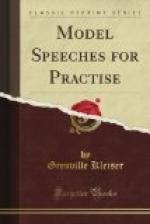You must not only thoroughly know yourself and your subject, but also your audience. You should carefully consider the best way to bring them and yourself into unity. You may do this by making an appeal to some principle commonly recognized and approved by men, such as patriotism, justice, humanity, courage, duty, or righteousness.
What Phillips Brooks said about the preacher, applies with equal truth to other forms of public speaking:
“Whatever is in the sermon must be in the preacher first; clearness, logicalness, vivacity, earnestness, sweetness, and light, must be personal qualities in him before they are qualities of thought and language in what he utters to his people.”
After you have earnestly studied the principles of public speaking you should plan to have regular and frequent practise in addressing actual audiences. There are associations and societies everywhere, constantly in quest of good speakers. There will be ample opportunities for you if you have properly developed your speaking abilities.
And now to sum up some of the most essential things for you:
1. READ ALOUD EVERY DAY
This is indispensable to your greatest progress in speech culture. Reading aloud, properly done, compels you to pronounce the words, instead of skimming over them as in silent reading. It gives you the additional benefit of receiving a vocal impression of the rhythm and structure of the composition.
Keep in mind the following purposes of your reading aloud:
1. To improve your speaking voice.
2. To acquire distinct enunciation.
3. To cultivate correct pronunciation.
4. To develop English style.
5. To increase your stock of words.
6. To store your memory with facts.
7. To analyze an author’s thoughts.
8. To broaden your general knowledge.
2. FORM THE NOTE-BOOK HABIT
Keep separate note-books for the subjects in which you are deeply interested and on which you intend some time to speak in public. Write in them promptly any valuable ideas which come to you from the four principal sources—observation, conversation, reading, and meditation.
You will be surprized to find how rapidly you can acquire useful data in this way. In an emergency you can turn to the speech-material you have accumulated and quickly solve the problem of “what to say.”
Keep the contents of your note-books in systematic order. Classify ideas under distinct headings. When possible write the ideas down in regular speech form. Once a week read aloud the contents of your note-books.
3. DAILY STUDY YOUR DICTIONARY
Read aloud each day from your dictionary for at least five minutes, and give special attention to the pronunciation and meaning of words. This is one of the most useful exercises for building a large vocabulary.




